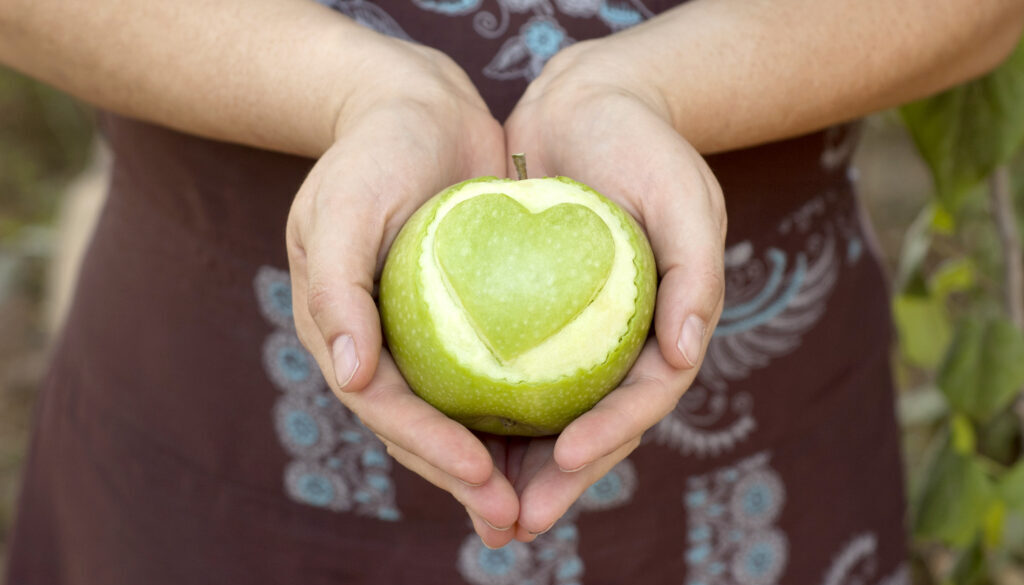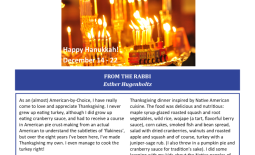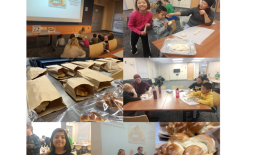Erev Rosh HaShanah Sermon 5785
A Pilgrimage of Love
‘How are you?’
It’s a loaded question, isn’t it? In Hebrew, ‘mah lach?’
We can take a moment to draw a deep breath and look around this sanctuary. Here we are, seated in this special, remarkable, nostalgic or perhaps new or unexpected place. We look each other in the eye. We smile shyly. We can ask each other how we are—and for a moment, hold each other with love as we hear—truly hear—the answer.
We are… fill in the dotted line. It’s complicated.
‘Mah lach’ – ‘how are you?’ Greeting each other like this is not a newfangled, modern thing. In fact, the two-thousand year old rabbinic writings of the Mishnah tell us about a unique ritual. Imagine the packed Temple courtyard in Jerusalem – like Kinnick Stadium but with better pyrotechnics – and pilgrims circumambulating it, moving clockwise with the throngs of passionate, pious masses. Imagine the thrill and ecstasy of being gathered in the holiest of places at the holiest of times.
You’ve been looking forward to this all year.
You’ve meticulously scrimped and planned and travelled to be here among the golden walls of the sacred city.
You feel the mass of bodies next to your own, the collective drama leaving you giddy.
You move clockwise in the parade, standing shoulder to shoulder with your fellow Jews, dressed in finery, feeling the presence of each other’s affection. Then, you see something else: a person, or a few people, moving against the grain, counter clockwise. They split the crowd like the Sea of Reeds. You wonder why the lone pilgrim moves against the masses, but you know this is part of the ritual. And you know what you need to do next: when they face you, you look them in the eye, with a heart full of tenderness, and ask:
‘Mah lach’—‘how are you?’
Then they reply. Honestly, openly, vulnerably. The ritual allows those struggling with loss, loneliness, bereavement or trauma to be seen in the fullness of their experience. The Mishnah recommends that if you are hurting, you move against the crowd, inviting in empathy. You walk the other way, aware of your emotional exposure, hoping that someone will notice and ask, lovingly, how you are.
And you share. ‘I lost my parent or my spouse. I am out of work. I feel overwhelmed by the suffering of the world. I am struggling with depression. I had a miscarriage. I’ve been diagnosed with stage four cancer. I’m going through a divorce. I feel alone. Help me, hold me. Give me a reason to feel, to hold on, and to hope.’
We all have such things on our lips. This sacred evening invites us to name them for ourselves, even if we whisper them only in our hearts. We do not circumambulate the Temple, as described in the Mishnah. But we make our own pilgrimage—a journey of the soul, to uncover the meaning of love and how it is lived.
This story of walking around the Temple courtyard and seeing the pain of your fellow pilgrims is the central theme of Rabbi Sharon Brous’ book ‘The Amen Effect – Ancient Wisdom To Mend Our Broken Hearts and World’. Rabbi Brous is a leading rabbi in today’s American Jewish community. She is the founder of Ikar Los Angeles, a community known for its vibrant musicality, deep spirituality and courageous commitment to social justice.
Rabbi Brous wrote this book based on years of preaching and pastoral work, walking with her community through grief, loss and change. The premise of ‘The Amen Effect’ is to learn how to say ‘Amen’ to each other’s blessings and trials. To show up for each other, whether it’s the funeral or Shivah minyan, the wedding, the much-needed cup of coffee with someone who needs support, the local food pantry or the social justice march. The ‘Amen Effect’ calls us to examine the purpose and place of holy community. This starts with looking each other in the eye, and asking ‘Mah lach’—‘how are you?’.
While ‘The Amen Effect’ is not a book about the High Holidays, it certainly is a book for the High Holidays. This short, accessible book will be one of the guides for our High Holiday season. It is searingly honest about loss, death and trauma. And, although written before this calamitous year, it is a heart’s cry that helps us feel our way through today’s pain. Rabbi Sharon Brous says the following:
“The only way we can serve each other is by showing up, not fortified and invulnerable, but in our frailty and fragility. The only way to enter the room, or the Courtyard, is to embrace our own vulnerability, to recognize that we’re not over and above the network of dependency and care, we are very much part of it…
But even still, it’s only when we’re willing to engage our whole selves, to embrace our own fears and struggles and admit that we, too, stand on unsteady ground, that we can meet another person in the heart of their pain.”
This past year, I have reflected often and deeply on the many layers of pain that our community experiences. I remember standing on this very bimah last year and sharing sharing my journey into Judaism, including the painful and hopeful parts. After the years of the pandemic, we catapulted ourselves into Jewish joy, the theme of last year’s High Holidays. I could not imagine how that joy would be turned into ashes in my mouth.
This year, we step into brokenness and uncertainty. Perhaps now many of us are walking counter-clockwise, yearning to be seen and to be held in love.
This High Holiday season, our journey will be a tender one; but it will also be bold, expansive and challenging. Our theme is Ahavah Rabbah, ‘A Great Love’, because it is love that helps us say ‘amen’. Out of all the possibilities we face, it is love that opens up our future. Our prayers are dripping with it, if you know where to look. It is the foundational truth of many of our lives. And yet, love is not sentimental. It is robust and it challenges us. Sometimes it stings; often it speaks truth, and always it helps us grow. It is the mirror we are invited to look in. Rabbi Shai Held in his book ‘Judaism Is About Love’, calls love ‘an existential posture’, a blending of emotion and action; a way of being in the world.
The question of ‘mah lach’; to ‘how are you?’ can only be met by love.
Love for ourselves, our community.
Love for the Jewish people.
Love for humanity.
Love for God.
Over the course of this High Holiday season, we will explore each of these facets of love.
Over this past year, I have been privileged to hear your struggles. Wrestling with our conscience, and struggling to find a place in our world. An existential loneliness on account of being Jewish; or, an existential loneliness among us Jews. It seemed like an impossibility that we would not crack or bruise or be wounded. ‘The first casualty of war is truth’, it is often said. I would add to that: empathy.
It is both impossible and important to name these things. I look at you now, seated here, each one of us a world entire; complex, rich, contradictory. Many days, I have felt the heaviness of bearing things far larger than myself. We all have been. We are tired. We are hurting. We are trying to feel our way into some kind of future.
Mah lach? How are you?
And yet, we gather here, by the flicker of our candles and the sonorous melodies of the Hebrew, because of the ‘Amen Effect.’
We sing the prayers and close with ‘amen’.
We decorate the patio. Amen.
We bake honey cake for the Oneg. Amen.
We give each other a furtive hug. Amen.
We check in on each other. Amen.
We polish the silver and set the food, print the name tags and reorganize the machzorim.
We give to the food pantry, donate to the High Holiday fund, help register voters, speak for the vulnerable, repair our small corner of the world.
We support and love each other as the only synagogue in town, with sacred intention and generosity of heart.
Amen, amen, amen, amen.
We do the impossible because we know the only way is through. We know, in this season of turning, of t’shuvah, that we come before our tradition, our Judaism, our God, with open hearts, because a broken heart is an open heart, where the cracks let in the light.
This is what it means to dwell in holy community. Among the cracks and fractures, we can create spaces—to see, to breathe, to think and dream. Among the smoldering ashes of the age, that is exactly what we will do together. We will walk against the grain, on this pilgrimage of the soul, holding each other under the banner of love, of ‘v’ahavta lerei’acha kamocha’, you shall love your fellow as yourself.
We will take one step forward.
And then another. And then another.
And we will carry each other through.
L’shanah tovah yoteir – may this year be a better year; a year of sweetness, of love and of peace.




